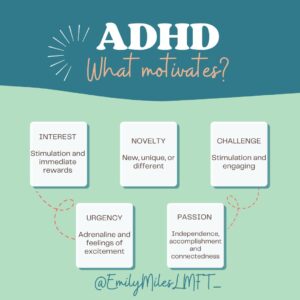
As a therapist who works with those diagnosed with ADHD, there are many tools and strategies I will explore with my clients as a means to help them manage their ADHD. These strategies help to target and accommodate the challenges those with ADHD face on a day-to-day basis. The neurodivergent brain is not motivated by the same things as a neurotypical brain, and it’s not a “willpower” thing either. Some parents, spouses and even the individual themselves may struggle to understand why they can’t just “see something, do something” when it comes to tasks. That is because ADHDers have an interest based neuro-system. INCUP is an acronym that stands for interest, novelty, challenge, urgency, and passion. The term was first proposed by psychologist William Dodson, who suggested that these five things are the top motivating factors for someone with ADHD.
You can use this information to help motivate yourself or your child who is living with ADHD.
INTEREST: Stimulation and immediate reward. Pursue work and activities where there is interest, which actually helps with the release of dopamine that the ADHD brain struggles to produce. You can work to make tasks more interesting by listening to music/audio books or engage in playfulness.
URGENCY: Adrenaline and feelings of excitement. Work around urgency, by using methods such as the pomodoro method or task scheduling with deadlines, and finding an accountability partner.
NOVELTY: New, unique, or different. Work around NOVELTY by changing your routine, including variety into your life, exploring new music/clothing/furniture or decor arrangements in your environment.
CHALLENGE: Stimulating and engaging. Challenge can also be worked with by engaging stimulation. This can be promoted by setting a timer, body doubling, or making tasks a competition.
PASSION: Independence, accomplishment and connectedness. Passion can be ignited by inciting a sense of accomplishment, finding purpose, connection to community/others and considering why the task may be important to your current or your future goals and values.
As a final note, because the ADHD brain is different than the neurotypical brain, we have to change our approach. Work with the brain you have, not the one you want. You can do this!
